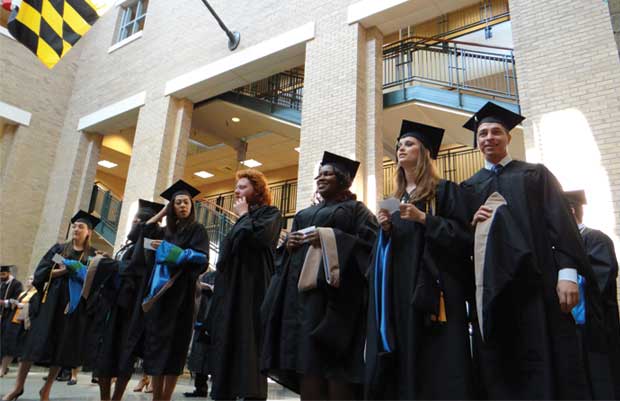At The University of Baltimore, we provide knowledge that works. Get real-world career preparation and the hands-on experience employers demand at a fraction of the cost of other universities. Pick courses that fit your schedule and create an education tailored to your vision and needs. Welcome to UBalt!
Merrick School of Business Strategic Plan 2024 – 2029
(The original 2016 plan has been updated and extended through 2029.)

Mission
The Merrick School of Business’s mission is to use our urban education hub to offer practical, career-minded, and globally engaged business education that inspires professional and entrepreneurial growth.
Our students learn to make a positive impact from faculty who develop compelling knowledge that influences communities, businesses, professions, and scholars.

Vision
We will be known for serving students from deeply diverse backgrounds who become successful entrepreneurs and professionals.
School of Business Strategic Plan
(Web Version)
In 2025, The University of Baltimore (UBalt) will reach an important milestone: its centennial anniversary. Back in 1925, a group of local business leaders founded a private school for the teaching of law and business. In the years since we have grown to become one of Maryland's most distinguished institutions. For generations now, we have been delivering leading-edge programs from the heart of Maryland's economic and cultural capital. The time is now for the Merrick School of Business (MSB) to lead the University’s renaissance by fully immersing our community in preparing graduates for a modern workforce.
This plan builds on MSB’s 2016-2020 strategic plan which was developed in consultation with members of our internal and external communities and set our sights on being known for serving students from deeply diverse backgrounds who become successful entrepreneurs and professionals.
During that plan’s development, and its update for the 2024-2029 plan, members of the Dean’s Business Advisory Council (BAC) reflected on UBalt’s and the MSB’s strengths, weaknesses, opportunities, and threats. The Board’s work, along with the efforts of our faculty, staff, and students, strived to identify, address, and create actions to grow and be relevant in a crowded field. These actions will offer a new pathway for the school and impact the career trajectories of our graduates and the influence that MSB can yield in the greater Baltimore business community.
This collective effort is fueled by a shared purpose - a commitment to empower those with unyielding ambition, enabling them to confront complex challenges head-on. We believe in the value of working hard as a catalyst to achieve one's aspirations and we stand behind those who exhibit resilience in overcoming obstacles. Through these principles, we are confident that aspiring business professionals and entrepreneurs will not only thrive but also make an impact on the world around them.
The Plan has five strategic priorities that align with The University of Baltimore’s 2018-2023 (now extended to 2026) “Re-Imagining UBalt: The University of Baltimore Strategic Plan” and the University System of Maryland’s current strategic plan “Vision 2030: From Excellence to Preeminence.” The current MSB plan systematically sets a direction to address the following priorities.
- Priority 1: Enhance student success by focusing on retention, graduation, and placement rates.
- Priority 2: Reverse the enrollment declines in our undergraduate programs.
- Priority 3: Develop STEM-designated graduate programs and grow enrollments in all graduate programs.
- Priority 4: Enhance the financial position of the school to achieve long-term stability and boost support for research and professional development for faculty an
- Priority 5: Enhance the level of engagement with the business community, particularly in the Greater Baltimore region.
Priorities
As a school dedicated to fostering career growth, our ongoing mission is to continually enhance our impact on our students' professional journeys. Our students embody exceptional determination, thriving within the dynamic landscape of the modern workforce. It is our unwavering aspiration to translate their relentless efforts into tangible success. Our pathway to achieving this aspiration lies in aligning ourselves with our students' unique circumstances and assisting them in attaining their academic degrees. The realization of their triumphs stands as our utmost priority. While acknowledging the intricate interplay of factors shaping student retention, we perceive our actions as collaborative endeavors. Through partnership and mutual engagement, we aim to steer them toward the timely attainment of their degrees, propelling them forward in pursuit of their ambitions.
Guided by this purpose, we have outlined three key strategies that we anticipate will enhance student success. These strategies are dedicated to nurturing student achievement by providing targeted interventions that ensure their trajectory toward graduation and eventual gainful employment.
Strategy 1 | Develop new opportunities for increasing undergraduate enrollment, engagement, career
preparation, and personal development.
Strategy 2 | Enhance the school’s advising outreach efforts with innovative and traditional techniques
to increase retention.
Strategy 3 | Increase philanthropic funding to further lessen student debt.
The B.S. in Business Administration is typically one of the most popular programs offered at any institution. In the academic year 2019-2020, U.S. higher education institutions conferred 387,851 bachelor’s degrees in business per U.S. IPEDS data. Degrees conferred in the health professions lag business by 130,569 degrees conferred during the same period. Also from that data, business degrees conferred see only a marginal change from year to year. Business schools have the potential to increase their market share by creating an environment and educational journey unlike any other.
The Merrick School's B.S. in Business Administration (BSBA) program equips our students with mindsets and skills necessary for lifelong learning and professional growth, especially in-demand skills like data-driven decision-making, critical thinking, and creative problem-solving, all with a strong foundation of managerial and financial skills. The BSBA program was revamped in 2023 by the faculty which included a core set of value propositions that balance the needs of our students and organizations that hire our graduates. The faculty made curriculum changes that align with our transfer students’ needs and skills required in the job market.
The B.S. in Information Systems and Technology Management program offers skills in the application of information systems technology to business and provides students with the knowledge and skills to enhance their job performance and allow for meaningful professional career advancement in the information technology area. This is the smaller of the two bachelor's programs.
We contend that we can position ourselves in a very crowded market by serving adult learners and growing our bachelor’s programs with value propositions developed by the faculty and support from the Office of Admission. To this end, we have outlined two key strategies. These strategies are focused on providing students with the currency they need to compete in a dynamic, global marketplace and for the school to grow in headcount and revenue.
Strategy 1 | Build a viable student pipeline for transfer students to the B.S. in Business Administration.
Strategy 2 | Expand our reach using institutional partnerships as a vehicle for collaboration and
growth.
We know this to be true—a graduate from our MBA/MS programs makes an immediate and meaningful contribution to their organization. The success is due to both the curriculum’s applied and practical approach and the expertise that faculty bring to the classroom. In 2022, a report developed for The University of Baltimore by an outside research group clearly articulated that our MBA/MS programs merit continued investment. And we agree. The MBA/MS programs continue to serve the labor market’s needs and students’ demands, but we must not rest on our past successes.
We recognize that relying on one product line like the MBA limits us in satisfying the demand for a diverse market. We see specialized master’s programs in STEM designated fields as an asset to grow enrollments and change the graduate pipeline declines, particularly when it comes to recruiting international students. Competition is fierce and evolving. In response, we must re-imagine how we deliver and what and how we deliver our graduate programs.
There are two separate markets with different fundamental delivery needs and marketing challenges:
- working professionals looking for part-time programs to enhance their careers, and
- international (F-1) students looking for programs that gain experience in the USA and career advancement with OPT (Optional Practical Training) possibilities.
However, both markets share the same key value proposition, which is career enhancement. The domestic student is looking to retool and learn new skills to grow in their current roles, start a business or make a career change. The international student is ideally aligned with the benefits that a STEM degree in a business discipline can bring to their career advancement. Our strategies reflect ways to increase graduate enrollments over the next five years.
Strategy 1 | Explore, expand, and rethink graduate programs and specializations.Strategy 2 | Develop a robust alliance with international partners to grow graduate programs.
Strategy 3 | Build on program collaborations with the sister University System of Maryland institutions.
Strategy 1 | Expand support for faculty research.
Strategy 2 | Expand opportunities for faculty and staff to bolster professional development activities
through conferences/symposiums, continuing education, professional networks and associations,
and externships.
Strategy 3 | Build on program collaborations with the sister University System of Maryland institutions.
Strategy 1 | Engage with the region’s employer environment to garner access and influence and
increase opportunities for our students, faculty, staff, and alumni.
Please contact the Office of the Dean with questions at 410.837.4955 or MSBDean@ubalt.edu.

